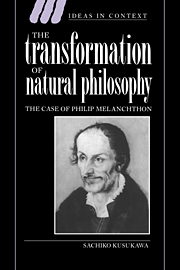Book contents
- Frontmatter
- Contents
- List of illustrations
- Notes on the text
- Acknowledgements
- Introduction
- 1 The way of the Schoolmen
- 2 Law and Gospel: the reforms of Luther and Melanchthon
- 3 The soul
- 4 The Providence of God
- 5 The construction of orthodoxy
- Conclusion: a transformation of natural philosophy
- Bibliography
- Index
- IDEAS IN CONTEXT
2 - Law and Gospel: the reforms of Luther and Melanchthon
Published online by Cambridge University Press: 06 November 2009
- Frontmatter
- Contents
- List of illustrations
- Notes on the text
- Acknowledgements
- Introduction
- 1 The way of the Schoolmen
- 2 Law and Gospel: the reforms of Luther and Melanchthon
- 3 The soul
- 4 The Providence of God
- 5 The construction of orthodoxy
- Conclusion: a transformation of natural philosophy
- Bibliography
- Index
- IDEAS IN CONTEXT
Summary
Beware lest any man spoil you through philosophy and vain deceit, after the tradition of men, after the rudiments of the world, and not after Christ.
Colossians 2. 8In October 1517 Martin Luther (1483–1546), an Augustinian teaching theology at Wittenberg, composed ninety-five theses attacking the validity of the indulgence system, and much more. It was an attack resulting from his new understanding of justification – that man is justified by faith in the crucified Christ alone. Luther called for the rectification of the failings of the Church and the establishment of the true message of the Gospel. This call for reform culminated in the complex and wide-ranging movement which we now call the Reformation. It was a movement in which the traditional teachings of the Papacy were first criticized, then challenged and finally rejected, while a new Lutheran theology and Church, with a distinct identity of its own, emerged. It was also a movement with significant intellectual implications.
In this chapter I rehearse some of the most well-known events of the Reformation amidst which significant changes took place in the arts faculty at Wittenberg. The philosophy teaching inherited from the medieval Schoolmen was rejected at Wittenberg by Luther on grounds of his new faith, and Philip Melanchthon (1497–1560) in turn found a new meaning and value for philosophy in defence of Luther's cause. My discussion of natural philosophy in this chapter may seem to be submerged under discussions about a greater change, but it is indeed only as part of the larger movement of the Reformation that we may understand the attitudes of Luther and Melanchthon towards the teaching of natural philosophy.
- Type
- Chapter
- Information
- The Transformation of Natural PhilosophyThe Case of Philip Melanchthon, pp. 27 - 74Publisher: Cambridge University PressPrint publication year: 1995



